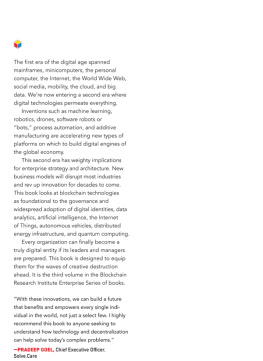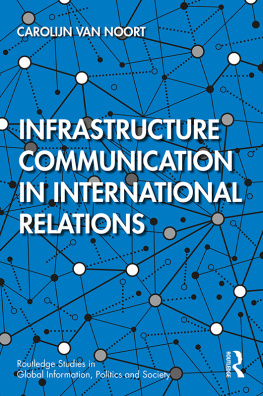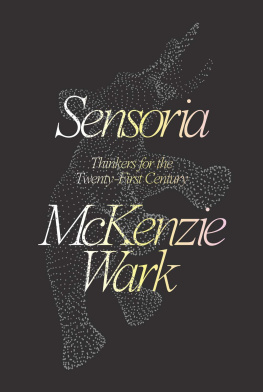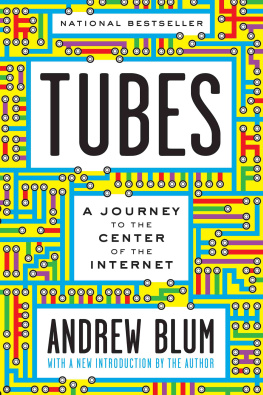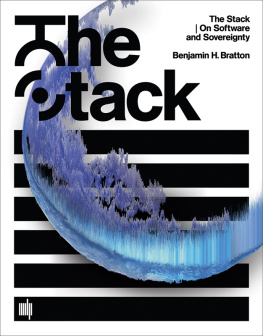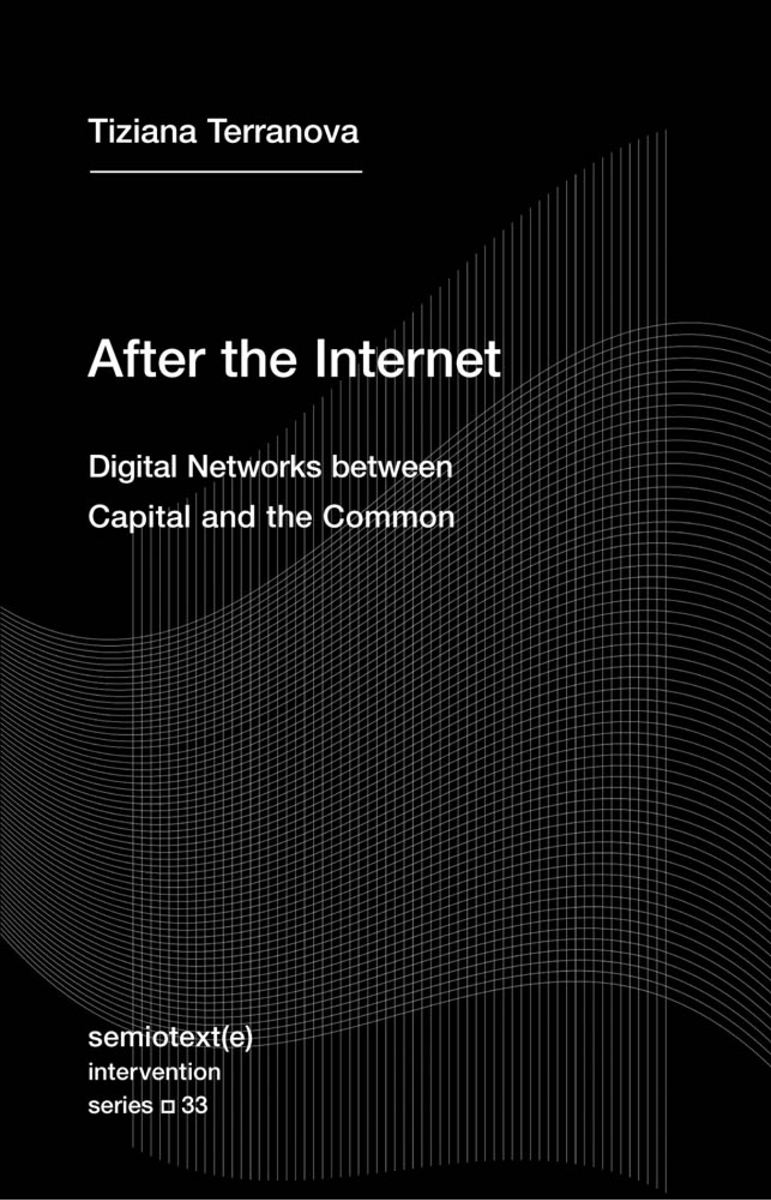SEMIOTEXT(E) INTERVENTION SERIES
Tiziana Terranova, 2022
All rights reserved. No part of this book may be reproduced, stored in a retrieval system, or transmitted by any means, electronic, mechanical, photocopying, recording, or otherwise, without prior permission of the publisher.
Published by Semiotext(e)
PO BOX 629, South Pasadena, CA 91031
www.semiotexte.com
Special thanks to Noura Wedell and Juliana Halpert
Design: Hedi El Kholti
Cover image: Lauren Mackler
ISBN: 978-1-63590-168-9
Distributed by the MIT Press, Cambridge, Mass., and London, England
d_r0
Contents
Introduction
(2022)
This Corporate Platform Complex (CPC) is currently ruled by a handful of very large and powerful companies (also known as Big Tech) bearing names such as Google/Alphabet, Amazon, Apple, Facebook/Meta, Microsoft, Alibaba and Tencent. Indeed, so powerful has the Corporate Platform Complex grown that the pandemic has actually acted like a booster in relation to it. In 2020 and 2021, while the global economy shrank significantly overall, the CPC's wealth soared as those who were confined at home or restricted in movement found themselves relying more than ever on digital connectivity. Indeed, not only did the so-called digital surge of 2020 made Big Tech richer overall, but it opened up new markets (video-conferencing, distance learning), and emboldened ever more expansive dreams. The Metaverse initiative, for example, launched by the company formerly known as Facebook in 2021, aims to make the pandemic experience of learning, working, socializing and playing at a distance an ordinary oneenvisioning a future crypto-economic, Pixar-like augmented/virtual world, where the digital and the real become perceptually indistinguishable.
The shift from the internet to the CPC can be seen at work in the technological, economic and cultural transformations of digital networking that significantly depart from the internet as we used to know it. Overall, there has been a significant shift from the internet as a set of interoperable network protocols governed by a series of public and/or voluntary non-profit organizations, to gated digital communities with strong ownership of data, software and infrastructure. Technically, the CPC has moved away from the symbolic centrality of peer-to-peer architectures towards a much stronger centrality of cloud computing corresponding to the shift from desktop to mobile devices. Automation has also been largely expanded in ways that make active use of data generated by users participationa crucial move in the regeneration of the artificial intelligence program currently at work in machine learning.
The economic transformation of digital networking is also starkly evident, as a technological infrastructure that mostly supported public or nonprofit uses has transmogrified into a gigantic business and industrial milieu characterized by high degrees of concentration. A close relationship with financial capital (from angel investors to venture capital to financial markets proper after the initial public offerings) is needed to get a foothold in the race for continuous disruption of existing markets (for example, transport, tourism, and food delivery). Network effects enable the successful platforms to create monopolies that support ecosystems composed by a multitude of smaller economic agents who completely depend for their sustenance on the larger actorsa model spearheaded by Google's AdSense and AdWords programs, but which is now ubiquitous and epitomized by Amazon Marketplace, the Android Play and Apple App stores but also by companies such as Uber and Airbnb.
Standards and protocols developed as part of the project of creating the internet as a public and open network still operate, but they are increasingly buried under a thick layer of corporate ones. The internet's own native subcultures, such as those that formed in the 1980s and 1990s, have gone underground, assembling in the so-called dark web, in IRC chats, in some forums, in pirate file-sharing networks, in websites with no social plugins, in mesh networks and wikis, and maybe also in the chaotic informational milieus of some secure, encrypted, open source messaging apps.
Reaching out with their data-mining tentacles, the new owners of the digital world have, as Marxists might say, subsumed the internet, that is, transmuted, encompassed, incorporated it, but not necessarily beaten or dissolved it. As a subsumed entity, the internet is not so much dead as undead, a ghostly presence haunting the Corporate Platform Complex with the specters of past hopes and potentials. Thus, whereby the CPC displays an increasing concentration of control, the specter of the internet persists as a much more muted, but perceptible aspiration towards an unprecedented distribution of the power to know, understand, coordinate and decide. While platforms ask us to accept contracts (terms and conditions) that bestow upon them the sovereign power to shut down, expel, ban and cancel those who do not comply with them, the specter of the internet remains as the possibility to connect through technical forms that do not transfer ownership of data or control of use. As platforms enforce a strict asymmetry between servers and clients, the internet insists that all nodes can be peer. In contrast to the degradation of public debate for the sake of measurable engagement caused by the CPC, the ghost of the internet whispers of the possibility of new types of collective intelligence. And while the platform economy turns digital labor into casual and precarious work, the undead internet insists on the superiority of commons-based production over proprietary accumulation of capital and of social (ethical, existential, aesthetic) values over the imperium of monetization or exchange value.
A Much-Abridged History of Networks
Since the 19th century, communication networks have operated at the speed of electrical and/or electromagnetic signals traveling through cables or through the airas with telegraphy, telephony, radio and television. As a type of electrical network, digital networks depend on electricity as well. However, unlike telegraphy, telephony or television, they present the unique feature of being composed by logical machines that can use micro-transistors to compute any function or activity which can be coded through programming languages as a series of executable instructions or algorithms. This is arguably related to the fact that contemporary digital networks are the first communication networks in history to deploy computational devices as nodes.
The first computer network whereby different machines in different locations could communicate to each other was ARPANETa wide-area, packet-switched network connecting computing centers affiliated with the Advanced Research Projects Agency of the United States Department of Defense. Launched in 1969, ARPANET was shut down in 1983.
Most of today's corporate platform giants were thus literally hatched between two financial crises, the smaller, circumscribed one of 2001 and the more systemic, global one of 2008. At the same time, they could not have possibly achieved the current dominance of digital networking if they had not been able to draw on financial capital to sustain them in the sometimes quite long periods before large losses turned into big revenue. Companies like Google, Amazon and Facebook were part of this new breed of internet businesses that inherited some of the features of the working cultures of the dot-coms, but, wary of the debacle of their immediate predecessors, were much more aggressively oriented towards monetization. The CPC arose as a reaction to the crash of 2001 assuming the initial form of the start-upa peculiar economic organization whose culture has been described by anthropologists and sociologists, narrated by novelists, depicted in films and TV series, chronicled by celebratory accounts but also painted in somber or lurid hues by disgruntled and disaffected ex-employees. Some of the characteristics of the start-up corporate culture that emerge from this plethora of studies and representations are: its youthful composition; the hyper-valorization of technical wizardry coded as male and the devaluation of linguistic, humanistic and social knowledges coded as female; its predominant whiteness colored by small doses of Asian-ness; the cult of the founder(s); the distinction between employees who own shares of the company and those who do not; and the demand for affective investment in the company's mission which it shares with most capitalist corporations, but which intensifies in specific ways. When successful, start-ups become unicorns, that is, privately owned companies that are valued at over one billion US dollars.


